We Help You Hire an Ionic Developer From South America

The process of hiring an Ionic from a nearshore company can often be confusing and time-consuming. You want a Cross Platform Ionic App developer with verified skills and experience who is smart, reliable, and hardworking.
Your organization can find the perfect fit for your development project using a custom AI matching algorithm. We ensure an excellent match for your team by combining data and personal interviews.
You can hire an Ionic App developer from our team who will contribute quality code immediately. We have refined our hiring process over the years, and many fast-growing startups trust it. Our Ionic Cross Platform App Developers are experts in their field, so hire yours with Hire Cross Platform Developer and we’ll add an expert to your team.
US Working Hours
We have South American Ionic developers who are able to work US hours so they can communicate and work well with your existing team.
Rates from LATAM
It has been a pleasure to bring together a wonderful group of Ionic app developers from Latin America who are eager to work with businesses in the United States.
One Simple Payment
You pay a flat monthly or hourly rate, and we take care of all employment taxes and employee benefits.
Vetted Ionic Developers Only
It is our guarantee that when you hire a Ionic developer with us, you are hiring a skilled professional who has passed our testing process.
Testimonials



Why Use Ionic for Cross Platform App Development?
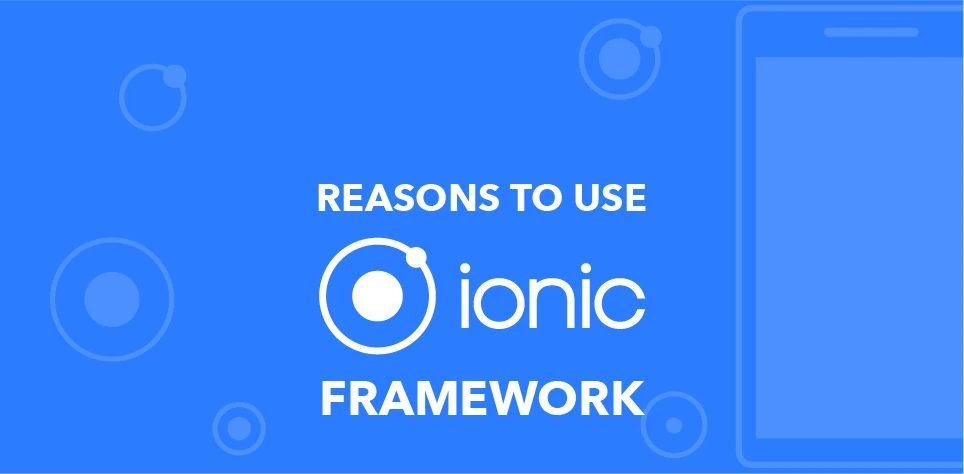
Ionic is a popular open-source framework used for developing cross-platform mobile applications. It allows developers to use web technologies like HTML, CSS, and JavaScript to build apps that can run on multiple platforms, including iOS, Android, and the web. Here are some reasons why you might consider using Ionic for cross-platform app development.
Single Codebase
With Ionic, developers can maintain a single codebase for multiple platforms. This means you can write the code once and deploy it on iOS, Android, and the web, saving significant development time and effort.
Rich Library of UI Components
Ionic comes with a rich library of pre-designed UI components, such as headers, footers, buttons, menus, and more. These components are customizable and can adapt to the platform on which the app is running, ensuring a consistent look and feel across all platforms.
Integration with Angular and React
Ionic is built to work seamlessly with popular JavaScript frameworks like Angular and React. This allows developers to leverage the powerful features of these frameworks, such as data binding, dependency injection, and component-based architecture, in their Ionic apps.

Ionic is a Powerful way to develop Apps for iOS, Android and Windows.
Ionic is a robust and versatile framework that empowers developers to build high-quality applications for iOS, Android, and Windows. By leveraging web technologies and providing a rich set of tools and features, Ionic simplifies the process of creating cross-platform mobile applications. Here’s how Ionic serves as a powerful tool for developing apps on these platforms.
iOS
Ionic allows developers to create iOS applications using web technologies like HTML, CSS, and JavaScript. It provides a library of pre-built components that follow iOS design guidelines, ensuring that the apps look and feel native to the platform. Additionally, Ionic’s integration with Cordova and Capacitor enables access to native iOS features.
Android
For Android app development, Ionic offers a similar set of benefits. Developers can use the same web technologies and pre-built components to create Android apps. The components adapt to follow Android’s Material Design, providing a native-like user experience. Access to native Android features is also provided through Cordova and Capacitor.
Windows
Ionic also supports building apps for Windows. While this is a less common use case, it’s a powerful feature for businesses that want to reach Windows users. With Ionic, developers can create a Windows app from the same codebase as their iOS and Android apps, ensuring consistency across all platforms.
- Cross-platform: One codebase, multiple platforms.
- Cost-effective: Reduces development time and cost.
- Rich UI components: Ensures consistent, appealing interfaces.
- Easy maintenance: Single codebase simplifies updates.
- Community support: Large, active developer community.
- Integration with frameworks: Works with Angular, React.
- Access to native features: Through Cordova and Capacitor.
- Future-proof: Regular updates, maintained by Ionic.

Maria Silva
Ionic Developer
8+ Years of App Development 4+ Years of Ionic Development.

Francisco de Oliveira
Ionic Developer
11+ Years of Native iOS Development 7+ Years of Ionic cross-platform Apps development.

Paulo de Souza
Sr Ionic App Developer
10+ Years of Kotlin Java 6+ Years of Cross Platform Ionic App development.
What does an Ionic App Developer do?
An Ionic App Developer is responsible for creating cross-platform mobile applications using the Ionic framework. They leverage web technologies like HTML, CSS, and JavaScript, along with Ionic’s rich set of tools and features, to build apps that can run on multiple platforms from a single codebase. Here are some key aspects of an Ionic App Developer’s job.
App Development and Design
Ionic App Developers write code to implement the functionality of the mobile app. They use Ionic’s pre-built UI components to design the app’s interface, ensuring it looks and feels consistent across different platforms. They also integrate the app with backend services and ensure it can access native device features.
Testing and Maintenance
Ionic App Developers are also responsible for testing the app to ensure it works correctly and provides a good user experience on all supported platforms. They identify and fix bugs, and they update the app as necessary to add new features, improve performance, or keep up with changes in the platforms or in the Ionic framework itself.
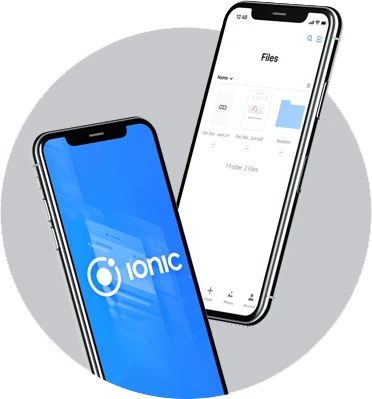
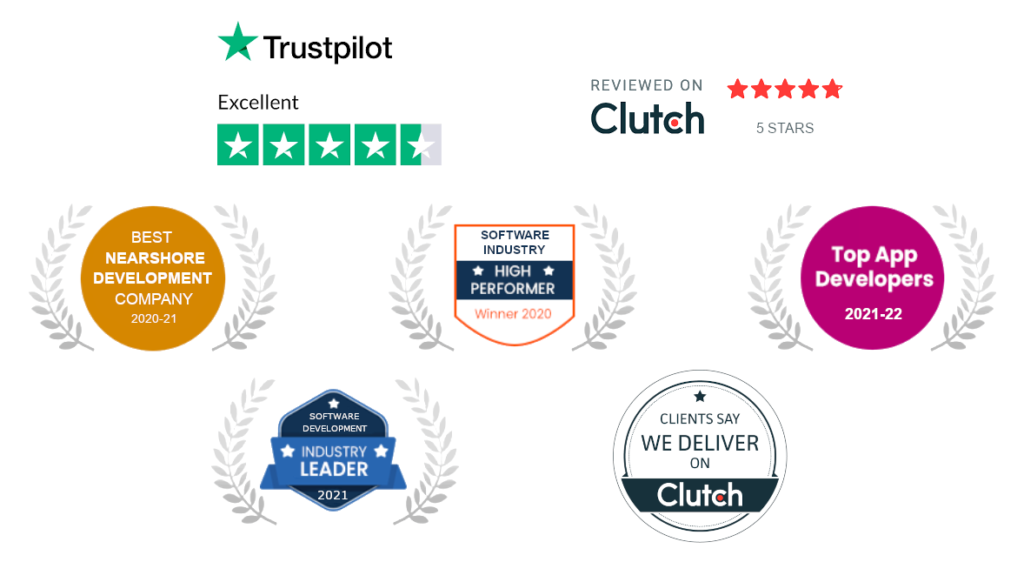
Proven Cross Platform App Development Partner
As cross-platform app developers, we understand the importance of a reliable and high-performing partner. To meet each customer’s needs, we provide a premium service. Send us a message now to get started with your app development team.
How to Hire a Ionic Developer?
Our Ionic App developers can be hired in three easy steps:
If you would like to send your requirements to us, please click the box below, fill out your requirements, click send, and send it by email.
Resumes are received and Ionic developers are interviewed. Shortlist the professionals you want to interview once proposals start arriving.
During your requirement description, you will find out what the scope of your work is and what kind of Cross Platform Ionic App development you require.
If you want a detailed response, include the following:
The scope of work includes iOS App, Android App development, and Desktop.
The length of the project should be indicated in your job listing.
Industry experience requirements, like finance, should be mentioned here.
In the billing section, indicate whether hourly rates or monthly contracts are more suitable for you.
Should you hire a Ionic or React Native Cross-platform app developer?
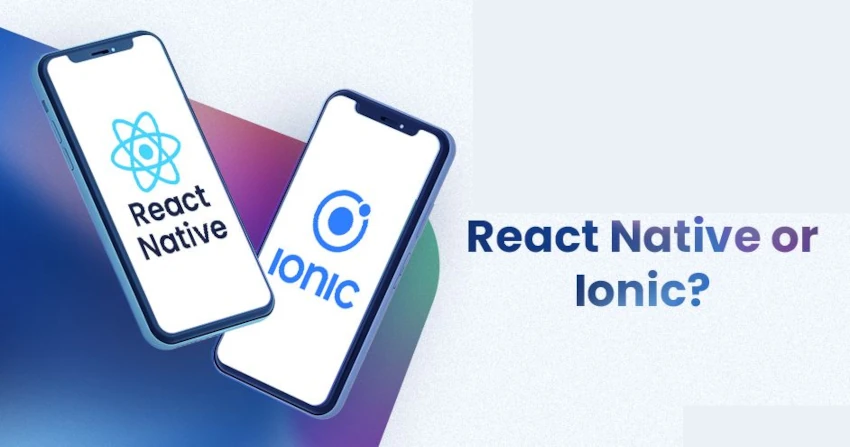
Choosing between hiring a React Native or an Ionic developer for your cross-platform app development needs depends on various factors. Both React Native and Ionic are popular frameworks for building cross-platform mobile applications, but they have different strengths and weaknesses. Here are some considerations to help you make an informed decision.
Performance and User Experience
React Native is known for its closer-to-native performance as it compiles to native code. If performance is a critical factor for your app, you might lean towards hiring a React Native developer. On the other hand, Ionic, with its web-based approach, offers a more consistent look and feel across platforms.
Future-Proofing and Flexibility
Both React Native and Ionic are backed by big tech companies (Facebook and Google respectively) and have active communities, suggesting a certain level of stability and future-proofing. However, your choice might also depend on the specific requirements of your project, such as the need for custom native functionality (favoring React Native) or a rapid development cycle (favoring Ionic).
How much does it cost to Hire an Ionic App Developer?
The cost of a project is influenced by expert knowledge, experience, location, and market conditions.
As an Ionic Developer acquires more experience, he or she will also be able to deliver better results, work faster, and have a greater understanding of the industry.
Those who are still gaining experience may be able to charge lower rates for Ionic App development.
The following hourly rates are available for Ionic developers in South America:
Junior
Prices From- Works to U.S time zones
- No Recruitment Fees
- Vetted Skills & Experience
- Fulltime Working for you
- No Unreliable Freelancers
Intermediate
Prices From- Works to U.S time zones
- No Recruitment Fees
- Vetted Skills & Experience
- Fulltime Working for you
- No Unreliable Freelancers
Senior
Prices From- Works to U.S time zones
- No Recruitment Fees
- Vetted Skills & Experience
- Fulltime Working for you
- No Unreliable Freelancers
We’re supplying Cross Platform Ionic App Developers from South America!
The cost of developers may vary slightly depending on the requirements for skill and experience and availability.
It’s up to you to decide which one is the best one for your project based on the specifics.
What does Ionic code look like?
Ionic code is primarily written in JavaScript, or more specifically, in TypeScript which is a statically typed superset of JavaScript. It also uses HTML for structuring the app’s user interface and CSS for styling. Ionic leverages Angular or React for creating the app’s components and managing its state. Here’s a simple example of what an Ionic component might look like:
import { Component } from '@angular/core';
import { AlertController } from '@ionic/angular';
@Component({
selector: 'app-home',
templateUrl: 'home.page.html',
styleUrls: ['home.page.scss'],
})
export class HomePage {
constructor(public alertController: AlertController) {}
async presentAlert() {
const alert = await this.alertController.create({
header: 'Hello',
message: 'Welcome to Ionic!',
buttons: ['OK']
});
await alert.present();
}
}
In this example, we import the necessary components from Angular and Ionic. We then define a class HomePage with a method presentAlert that creates and presents an alert when called. The alert says “Welcome to Ionic!”. The HomePage component is associated with a template file ‘home.page.html’ and a style file ‘home.page.scss’.
Interview Questions to ask an Ionic Developer before you hire them
Can you explain the difference between Ionic and other mobile app development frameworks like React Native or Flutter?
This question helps you understand if the candidate knows the fundamental differences between Ionic and other popular frameworks. Their answer should touch on the different environments they’re used in, the different languages they use, and how they compile to native code.
How do you handle performance optimization in an Ionic application?
Performance optimization is key in mobile app development to ensure a smooth user experience. This question will help you understand the candidate’s experience and approach in improving the performance of an Ionic app. They might discuss strategies like lazy loading, optimizing images, or reducing the size of the JavaScript bundle.

Can you describe a project where you had to integrate an Ionic app with a backend service?
Most mobile apps need to interact with a backend service to function fully. This question will help you gauge the candidate’s understanding of how to make HTTP requests, handle responses, and manage data in an Ionic app. They might discuss using Angular’s HttpClient, handling CORS issues, or managing state with services.

Do you like to write code as part of a team? or do you prefer to write code alone?
This question can be answered in any way, so there is no right or wrong answer. If you are looking to hire an ionic engineer, you may need to hire one who is hardworking and independent. On the other hand, you might want someone who is good at working with others in a team and not head strong.
How do you ensure that an Ionic app provides a consistent user experience across different devices and platforms?
One of the challenges of mobile app development is ensuring that the app works well on a variety of devices and platforms. This question will help you gauge the candidate’s understanding of the nuances of different platforms (iOS, Android, and Windows) and their approach to testing and quality assurance. They might discuss responsive design, platform-specific styles, or testing on different devices and emulators.
Ionic Development History

Ionic is a popular open-source framework for building cross-platform mobile applications. It was created by Max Lynch, Ben Sperry, and Adam Bradley of Drifty Co. in 2013. The development of Ionic is marked by several key milestones that have contributed to its growth and popularity.
The Birth of Ionic
Ionic was born out of the need for a better operating environment for hybrid mobile applications. The creators, dissatisfied with the existing mobile development frameworks, decided to build their own. Ionic 1.0, based on AngularJS, was released in 2014, offering a library of pre-designed components, gestures, and tools for developing hybrid mobile apps.
Evolution and Growth
Ionic 2.0 was released in 2016, coinciding with the release of Angular 2.0. This version introduced significant changes, including a shift to a modular architecture. Over the years, Ionic has continued to evolve, adding support for other frameworks like Vue.js and React, and improving performance and developer experience.
Ionic Today
Today, Ionic is one of the most popular frameworks for building mobile applications. It’s used by millions of developers worldwide and powers apps for some of the world’s leading companies. The Ionic team continues to innovate, regularly releasing updates and new features to keep the framework at the forefront of mobile app development.
Why we are a great choice to hire an Ionic Developer with?
With years of experience providing Nearshore Cross Platform App Solutions, we offer experienced Ionic developers at competitive prices. Offering scalable, high-performance solutions to our clients.
The expertise we possess in cross-platform app development and project management allows us to accelerate or rescue development projects. With every project we develop, we strive to create lasting value.
Over a hundred startups and tech companies across the world have trusted us to match skilled developers with great teams.
With our Ionic developers on your team, you can count on them to become dedicated team members, fully integrated into your operations.
To ensure the quality of our Cross Platform Ionic App developers, we conduct a thorough vetting process to determine their communication abilities, remote work readiness, and technical skills (both in Cross Platform JavaScript and App development, as well as software development in general).
Better Prices
Usually, companies outsource to reduce costs. An App developer hired from outside the United States will cost less. You will also be able to significantly reduce overall employment costs. No US or European employment taxes, benefits, or redundancy liabilities will apply.
Scaling Advantage
It is possible for any industry to gain a competitive advantage through quick expansion and downsizing. The benefits of outsourcing South AMerican App developers to us are that your business can scale up or down as needed.
Experience in Cross Platform App Development
Outsourcing App development gives you access to a company with extensive experience in helping businesses succeed. Therefore, you can be confident that your application will be delivered on time and on budget.
What kind of Apps do Ionic developers create?
<p>Ionic developers create a wide variety of cross-platform mobile applications. Given the flexibility of the Ionic framework, they can build anything from simple utility apps to complex enterprise-level applications. For instance, they might create e-commerce apps that allow users to browse products, add them to a cart, and make purchases.
They could also build social networking apps that enable users to connect with others, share updates, and send messages. Productivity apps, such as task managers or note-taking apps, are another common type of application that Ionic developers create. They might also work on content-focused apps, like news aggregators or e-learning platforms.
Furthermore, they can develop more complex applications, such as banking apps that handle sensitive user data and transactions. Regardless of the type of app, Ionic developers aim to create a seamless and engaging user experience across both iOS and Android platforms.
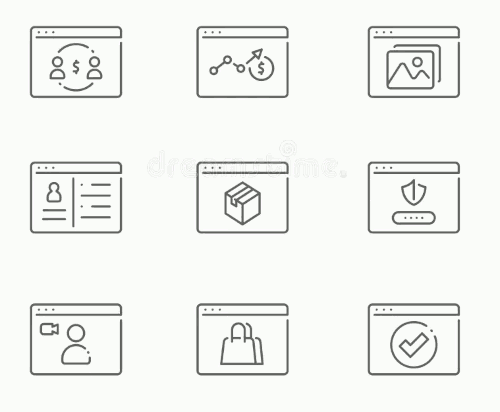
- E-commerce apps for online shopping.
- Social networking apps for community building.
- Productivity apps for task management.
- News aggregators for current affairs.
- E-learning apps for online education.
- Financial apps withl transactions.
How do we code test an Ionic Developer?

To code test an Ionic developer, we start with a technical interview where we ask them to explain concepts and solve problems related to Ionic and the underlying technologies like Angular and React. This gives us an idea of their theoretical knowledge. Then, we provide them with a practical coding challenge. This is a small project app. We ask them to write the code for this app in Ionic and explain their thought process. This tests their practical skills, problem-solving abilities, and communication.
We also ask them to review a piece of Ionic code and suggest improvements. This will test their code understanding and optimization skills. Finally, we use pair programming to see how they code in real-time. This gives us an insight into their working style and how they handle pressure.
How do you manage Ionic Developers after you hire them?
Normally, AI developers are supported by teams with a variety of skill sets that need to be managed effectively. A strong management structure is also essential for retaining technical talent.
Clear Communication

Provide Necessary Tools and Resources
Equip your developers with the necessary tools and resources to do their job effectively. This includes software, hardware, access to online resources, and training materials.
Regular Feedback and Recognition
Provide regular feedback to your developers about their performance. Recognize and appreciate their hard work and achievements. Constructive feedback helps them improve, while recognition boosts their motivation.
Encourage Continuous Learning
The tech industry, including Ionic, is always evolving. Encourage your developers to continuously learn and stay updated with the latest trends, techniques, and best practices in Ionic development. This could be through training, workshops, or conferences.
Promote Team Collaboration
Promote a collaborative work environment where developers can work together, learn from each other, and solve problems collectively. This can lead to better solutions, faster problem-solving, and a more cohesive team.

How long does the average Ionic Developer job last?
The average Ionic Developer in the US stays in the role between 1.2 and 2.8 years after they are hired, with larger companies tending to retain workers longer. In Brazil developers tend to spend a little longer in the same job at 1.8 and 3.6 years respectively. Traditionally, people spent their entire careers with the same company.
It’s not uncommon for experienced Cross Platform Ionic App developers to move from one job to another, seeking new opportunities and more money, as such longevity has decreased over time. In this market, where there is a low unemployment rate and a desperate need for cross platform app developers, cross-platform app pros can migrate between jobs fairly easily (or even freelancing). A key component of our employee retention strategy is communication. We offer perks to keep top talent.

Frequently Asked Questions (FAQs)
Our services are trusted by hundreds of startups and tech companies worldwide, and we have matched hundreds of skilled developers to great development teams in the US, UK and Canada. Every Ionic developer in our network goes through a vetting process to verify their communication abilities, remote work readiness, and technical skills, both for depth in Cross Platform App development and breadth across the greater programming domain.
The job description of a Cross Platform Ionic App Developer should include the following:
Developing, implementing, and managing apps
New app testing and evaluation
Enhancing existing apps by identifying areas for improvement
Coding in an efficient manner
Analyzing operational feasibility
Establishing procedures for quality assurance
Implementing software tools, processes, and metrics
Upgrades and maintenance of existing systems
Assisting other developers, UX designers, and business analysts with their tasks
It’s not enough to just ship features; your software needs to help your business succeed. In order to better understand what you’re building, for whom, and why, we’ll begin our collaboration with a discovery process.
Our headquarters are in Sao Paulo, Brazil. We have clients from all over the world. We have successfully collaborated with companies in North America, Asia, the Middle East, and Europe. A good understanding of each client and excellent English communication skills help the process run smoothly.
We can work with you to scale the team down as needed and make sure you have the correct skills required for each project phase.
All Types! You can hire a Cross Platform Ionic App developer on a full-time, part-time, or contract-to-hire basis at Hire Cross Platform Developer. You can find a Ionic developer in a time zone that suits your needs thanks to our global network of skilled app developers who work remotely for us and are ready to code right away.

